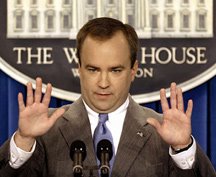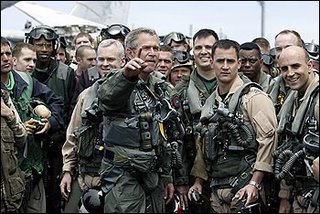Just a Prediction...
Bureacratic inertia being what it is, most law in this country doesn't get repealed when we find that it's worthless, dangerous or just plain stupid. The same goes for Executive Orders. That's one of the reasons why there are EOs declaring a state of emergency still in effect that go back to the FDR administration. Instead, they are endlessly modified, since the raw change of simple repeal or revocation is perceived to be disruptive of government operations, and there's also the matter of politicians not wanting to create precedent (i.e., that their successors won't do the same thing to their legislation or orders).
What's been happening in the last few years, though, are some giant steps toward an authoritarian government that few of us are going to appreciate at all once it's in its more or less final form, thanks to Dubya's interminable "war on terror."
What Bush and Co.™ have done to date is find every possible way that they can to ignore the law. Sometimes the rationales are complex and legal and torturously contrived; sometimes they're just bald-faced "fuck you"s to the courts and Congress. One of those "fuck you"s has been their increasing use of what has been known, ever since 1953, as "state secrets privilege." As Glenn Greenwald points out here, this is not law, but an assertion by the government of an inherent right to maintain security, which was upheld by the Supreme Court in United States v. Reynolds.
In this case, the government demanded dismissal of a suit filed by the widows of three people who had been killed in the crash of an Air Force plane. The widows asserted that the plane was badly maintained and that the Air Force was culpable in the deaths. The government said, however, that the suit had to be dismissed as judicial discovery would reveal national security secrets. The Supreme Court said, in essence, that the security of the country was not only a countervailing force against discovery, but a compelling national interest against tort in itself, and upheld dismissal of the case on national security grounds.
With the high court having set that standard, few judges want the hassle of challenging the government's assertion of the privilege, and some have seen invocation of the privilege by the government as virtually automatic grounds for dismissal.
The Bushies are really pushing this envelope, however--in part, because it's just so darned easy to do in the current environment. The government likely intends to invoke the privilege in a current suit that doesn't even involve the government--the Electronic Freedom Foundation v. AT&T. In that case, EFF received documents and other evidence from a phone system worker that showed AT&T had made arrangements with the National Security Agency to tap into AT&T's digital traffic at a routing center in San Francisco, and that the equipment used and the manner of the tap both suggested wholesale interception of data without warrant. Yesterday, the government sent notice to the judge that it would likely invoke state secrets privilege.
In similar fashion, the privilege was invoked recently in the case of Sibel Edmonds, an FBI translator who was fired for blowing the whistle on irregularities within the FBI's translation unit. Even though her standing for filing suit was reinforced by an FBI Inspector General report which substantiated the bulk of her claims, the Justice Department invoked the privilege in her case and the suit was dismissed (by the same judge, Reggie Walton, now hearing the US v. I. Lewis Libby perjury and obstruction of justice case).
The privilege may yet be used in another case, filed in Oregon. In that case, the managers of a now-defunct Islamic charity claim that the government illegally violated client-attorney privilege by intercepting their communications by phone with their lawyers. The apparent proof of that violation was in a classified document supplied by the government during discovery. Once the government realized it had given the plaintiffs the document, they immediately began trying to retrieve it, and failing that, to have the judge in the case deny its introduction on national security grounds and have it permanently sealed. If the judge doesn't go along with this ploy, it seems certain that the government will attempt to invoke privilege and have the case dismissed.
All this depends upon a trust between the Judiciary and the Executive branch that the President's men aren't attempting to hide wrongdoing by invoking the privilege, which sort of flies in the face of common sense, since that determination ought to be made on the evidence. In fact, in the case which set this precedent, the Supreme Court trusted the government to make honest representations of the nature of the facts, even if the government did not provide the facts themselves. That trust was unwarranted, as the facts showed later. Almost fifty years after the 1953 decision, the Air Force declassified the documents which it originally sought to protect. No national security issues could be determined from them, but gross negligence was apparent. The Air Force, had indeed used national security to hide culpability in the deaths. Still, the precedent remained.
The tendency to use Executive Orders beyond original intent is prominent in this administration, as well. The most egregious example is Bush's order EO#13223, regarding the procedures to be followed in administration of the Presidential Records Act. The Act is quite specific and unambiguous about the government's rights to Presidential and Vice-Presidential papers, except in some narrowly-drawn exceptions for "Constitutionally-based" executive privilege and national security matters. Bush's order simply ignored the language and intent of the law, proscribing release of those papers if there were objections by the sitting President, an ex-President or ex-Vice-President. Those rights even extended to the heirs of an ex-President or ex-Vice-President.
This was, in practical terms, an abrogation of law by administrative fiat. Moreover, the Order signed by Bush was transparently to protect his father's interests as an ex-Vice-President (and ultimately his own interests as an ex-President), since the Reagan Library had already received national security clearances for many of Reagan's papers and had requested release of virtually all of the 68,000 pages of Reagan's papers. Bush simply ignored the request, which ultimately was delayed many months. His father's Vice-Presidential papers have yet to be released for public and scholarly inspection, even though the law mandated their release no later than January, 2001.
Let's not leave Congress out of this mess, and first, let's be honest--some of these yokels deserve some suspicion, about their character, their honesty and their intelligence, not to mention their sanity. And, you know it's true, if you saw some of them walking down the sidewalk in front of your house, your first reaction would be to hide your daughters, your sons, your pets and your checkbook, then call for a patrol car, pretty much in that order.
For more than four years, the current bunch of partisan hacks have given a dweeb like George Bush anything he wanted, anytime he wanted it. All he had to do was give an otherwise incomprehensible speech and repeat "terra" about four thousand times. It may take some time for this to sink in, but Bush and the people in Congress who've enabled him are the terrorists. They're the ones who hate your freedom. They're the ones who are telling you they're protecting you while they're ripping you off, spending your money (and your future) on their friends (lobbyists and their clients), and trying to scare the shit out of you every chance they get. Or, if you doubt them--or, heavens forbid, don't like them and say so--want to put you in jail, or put you behind a chain link fence far enough away from them that they can ignore you with a clear conscience. Want a thrill? Read the whole goddamned PATRIOT ACT and ask yourself if some of these mental pygmies in Congress representing Bush and Co.™ could write something like that in three weeks? Hell, just ask yourself why virtually no one in Congress read the damned thing before passing it.
Y'know, I'm really hoping that one of these days, some really bright guy figures out time travel. Because I'm gonna book a ride back to the Constitutional Convention in 1787. And then I'm gonna tattle on a bunch of people, including George Bush and his sleazy father, to James Madison.










